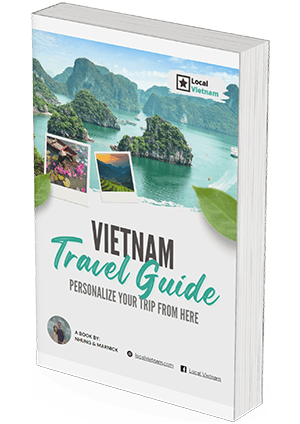What is a VPN?
A VPN (Virtual Private Network) is a tool that creates a secure, encrypted connection between your device and the internet. It works by routing your online activity through a private server, masking your real IP address and encrypting your data to keep it safe from hackers, trackers, or prying eyes.
Benefits of using a VPN
- Protecting your data on public Wi-Fi: VPNs safeguard your sensitive information, such as passwords and banking details, when using unsecured public Wi-Fi networks in cafes, hotels, and airports.
- Accessing restricted websites: A VPN can bypass geo-restrictions or censorship, giving you access to blocked content.
- Ensuring privacy and avoiding tracking: By hiding your IP address, a VPN prevents websites and advertisers from tracking your online activities.
Do you need a VPN for Vietnam?
Vietnam’s internet is relatively open, but there are still reasons travelers might consider using a VPN. Below, we explore potential restrictions and the importance of online safety and privacy.
1. Restricted websites
For most travelers, internet access in Vietnam won’t be an issue. The majority of websites are accessible, including essential platforms like Google (Maps and Translate), Facebook, Instagram, and WhatsApp.
However, certain news websites and adult content may be restricted. While these limitations are minimal, a VPN can help you bypass these blocks if needed. For the average tourist, though, these restrictions are unlikely to interfere with their trip.
2. Accessing content restricted outside Vietnam
While most websites and platforms are accessible from within Vietnam, some international services restrict access based on your location. This means that even though Vietnam itself doesn’t block these websites, the services may not allow you to view their content from outside their primary region.
This is particularly common with:
- Streaming services: Local streaming platforms, like BBC iPlayer (UK) or Hulu (US), often restrict content to viewers within specific countries due to copyright or licensing agreements.
- Online banking: Certain banks or financial services may block logins from Vietnam as a security measure.
- Educational or professional tools: Platforms like learning portals or workplace intranets sometimes limit access based on location.
3. Safety and privacy
- Public Wi-Fi risks: With free Wi-Fi available in hotels, cafes, and restaurants across Vietnam, your data may be vulnerable on unsecured networks. A VPN encrypts your connection, protecting sensitive information like login credentials or banking details from potential hackers.
- Enhanced privacy: A VPN hides your online activity, preventing websites, advertisers, or even internet providers from tracking your behavior. This is especially useful if you’re managing sensitive accounts or conducting private communications.
Internet accessibility in Vietnam
Vietnam offers excellent internet connectivity, making it easy for travelers to stay online throughout their trip. Whether through Wi-Fi or mobile internet, you’ll have no trouble accessing the web.
Wi-Fi availability
Free Wi-Fi is widely available in hotels, cafes, restaurants, and even public spaces. Most establishments offer reliable connections, so you can check maps, send messages, or browse the web conveniently without needing mobile data.
For a detailed guide on internet availability, speed, and tips for staying connected, check out: Internet in Vietnam
Mobile internet
For travelers who prefer on-the-go connectivity, SIM cards are affordable and easy to purchase. Local providers like Viettel, Vinaphone, and Mobifone offer excellent coverage across the country. With a local SIM card, you’ll have access to fast mobile internet, ensuring you’re always connected.
Learn more: Buying a SIM Card in Vietnam
Best VPNs for Vietnam
If you decide to use a VPN in Vietnam, here are three top-rated options that cater to different needs, offering reliable service and excellent features.
1. NordVPN
- Features: High-speed servers, military-grade encryption, and a strict no-logs policy to ensure complete privacy. It also provides specialty servers for P2P, Double VPN, and Onion over VPN.
- Costs: Starting at $3.99/month with long-term plans.
- Best for: Travelers seeking high-level security and reliable access to restricted websites.
2. ExpressVPN
- Features: Known for its user-friendly interface and blazing-fast connection speeds, ExpressVPN is ideal for streaming content like Netflix, Hulu, or YouTube without buffering. It also includes split tunneling and a kill switch for added safety.
- Costs: $6.67/month with a 12-month plan.
- Best for: Streaming content and general online privacy.
3. Surfshark
- Features: Offers unbeatable value with affordable pricing, support for unlimited devices, and strong security measures, including CleanWeb to block ads and trackers.
- Costs: $2.49/month with a 2-year plan.
- Best for: Budget-conscious travelers and families with multiple devices.
Tips for using a VPN in Vietnam
Using a VPN effectively during your trip can enhance your online security and ensure smooth connectivity. Here are some practical tips:
1. Choose a server location
- For optimal speed, select servers located in nearby countries (e.g., Singapore or Hong Kong).
- If you need access to region-specific content, choose servers in your home country.
2. Use a VPN on public Wi-Fi
- Always enable your VPN when connecting to public Wi-Fi networks in hotels, cafes, or airports to protect your personal data from hackers.
3. Test the connection before your trip
- Install and set up your VPN before leaving home to ensure compatibility with your device and resolve any potential issues in advance.
4. Offline downloads
- Some VPNs allow you to download websites or content for offline browsing, a useful feature in areas with unreliable or no internet access.
5. Monitor performance
- If you notice slower internet speeds, try switching to a different server or protocol within your VPN settings to improve performance.


